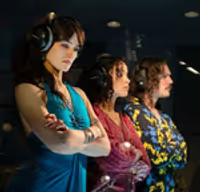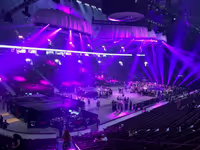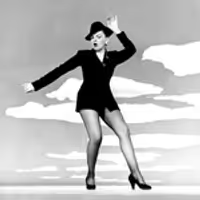Shows that require “in ears”
#1Shows that require “in ears”
Posted: 5/15/19 at 11:39amI saw Six in Chicago last night and noticed that all the actresses were wearing in ears as if they were performing in an actual concert. I thought it was strange, but I guess since the show is more similar to a concert than a standard show its probably needed. Are there any other shows that are noticeable of having the actors needing ear pieces to get the notes and tempos? I think I remember reading In Transit needing them. Other than that I cant think of anything.
#2
Posted: 5/15/19 at 1:29pmOctet uses them currently, I believe. Personally, I think the show would benefit from zero amplification, but I have no idea what that would do for the sound, logistically speaking. More as an experiment.
trpguyy
Broadway Legend Joined: 2/25/05
#3
Posted: 5/15/19 at 1:58pmIn Transit, Great Comet, Spring Awakening revival, Hair have all used them to some degree
Music_Maker42
Chorus Member Joined: 5/2/19
#4
Posted: 5/15/19 at 2:24pmIs that because the band/orchestra was located elsewhere in the cases of Comet and Hair? Also there’s a lot of parts in the music. For a cappella I totally understand. For the others I’m kind of wondering why.
#5
Posted: 5/15/19 at 2:43pm
China Doll.
AEA AGMA SM
Broadway Legend Joined: 8/13/09
#6
Posted: 5/15/19 at 3:15pm
In the case of Great Comet it wasn't just because the band was in a different place, but because the cast was all over that theatre. Providing traditional monitors to cover every space they were in would have been a designer's nightmare.
Shh_413
Stand-by Joined: 4/24/18
#8
Posted: 5/15/19 at 4:28pm
They were used in the Hedwig revival, likely for the reasons you stated in your first post—it was so similar to a concert.
trpguyy
Broadway Legend Joined: 2/25/05
#10
Posted: 5/16/19 at 8:40am
Music_Maker42 said: "Is that because the band/orchestra was located elsewhere in the cases of Comet and Hair? Also there’s a lot of parts in the music. For a cappella I totally understand. For the others I’m kind of wondering why."
Generally speaking, it’s all about getting the performers to hear what they need to hear without negatively impacting what the audience hears.
The cast and/or band being significant spread out (Comet, In Transit, Spring Awakening), an onstage rock/horn band (Hair), loud sound effects (Let It Go) are all things that would make the use of traditional/loudspeaker monitors extremely challenging.
There is also the fact that performers have very different opinions on what they like to hear, and catering to everybody’s needs/wants is not always possible with traditional monitors. In ear monitors allow for much more individual control.
#11Should they give Eden In Era Monitors?
Posted: 3/31/24 at 1:21pm
Can anyone confirm Eden’s pitch issues in Lempicka and would providing Eden with in ear monitors rectify those issues?
#12In Ear Monitors
Posted: 3/31/24 at 1:58pm
trpguyy said: " . . . There is also the fact that performers have very different opinions on what they like to hear, and catering to everybody’s needs/wants is not always possible with traditional monitors. In ear monitors allow for much more individual control."
Interesting Can you explain the differences in what performers might want to hear?
#13In Ear Monitors
Posted: 3/31/24 at 8:34pm
Rumpelstiltskin said: "trpguyy said: " . . .There is also the fact that performers have very different opinions on what they like to hear, and catering to everybody’s needs/wants is not always possible with traditional monitors. In ear monitors allow for much more individual control."
Interesting Can you explain the differences in what performers might want to hear?"
I've been into this topic recently so I'll offer the most polar examples as: 1) hearing everything just like we do as the audience and they can see a conductor somewhere or 2) hearing only themselves with a click track/minimal music. You might find this example of what an artist - Taylor Swift in this case - might choose to hear in their in-ears intereseting. Stripped-down music, a metronome, count-ins and not much else. Extremely common for concerts, and I'm sort of surprised it's not more common for musical theatre - but possibly because of my point number one?
Now I want to ask my friends who do concerts and theatre the difference...and I think I just might in the coming days.
Alex Kulak2
Broadway Legend Joined: 9/11/16
#14In Ear Monitors
Posted: 3/31/24 at 8:40pm
Rumpelstiltskin said: "trpguyy said: " . . .There is also the fact that performers have very different opinions on what they like to hear, and catering to everybody’s needs/wants is not always possible with traditional monitors. In ear monitors allow for much more individual control."
Interesting Can you explain the differences in what performers might want to hear?
"
If a particular number is blocked in a way where they don't have a direct sightline with the pit (or if the band is offstage and connected with a video monitor), then some singers might need extra help keeping time with the orchestra, especially if they don't have technical musical training. This might be as simple as adding in a click track if the band uses one. If an instrument in the orchestration doubles their vocal line, that might be amplified in their ear only. If another instrument is playing a note that's a close harmony, that may be dampened in the ear so it doesn't throw off the singer. Or, possibly when actors are singing some complex harmonies, the in-ear monitor might only pump in the other people on their note so they stay on pitch.
This is not to say that the use of any of these monitor tricks mean the performer is a bad singer. There are plenty of incredible singers on Broadway that can't read music and don't have perfect pitch. It's just about giving singers the tools they need to deliver the best possible performance to the audience.
#15In Ear Monitors
Posted: 3/31/24 at 10:34pm
Many thanks for the replies. It’s fascinating to learn how everything comes together.
#16In Ear Monitors
Posted: 4/1/24 at 12:46am
So… after this conversation. Would Eden benefit from in ears. Genuinely curious, because I feel like she has the potential to be great
#17In Ear Monitors
Posted: 4/1/24 at 7:30am
Eden has had pitch issues for years, even pre-pandemic. I’m not sure if in-ears would help much at this point.
chrishuyen
Broadway Legend Joined: 11/12/14
#18In Ear Monitors
Posted: 4/2/24 at 12:07pm
Probably an obvious addition at this point but just to answer the original question, Here Lies Love did have in-ears as well (understandably).
Videos








